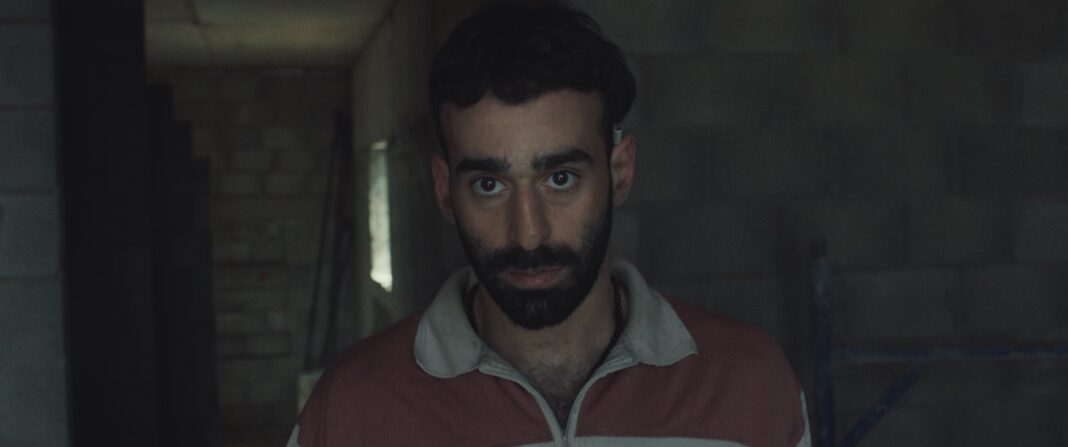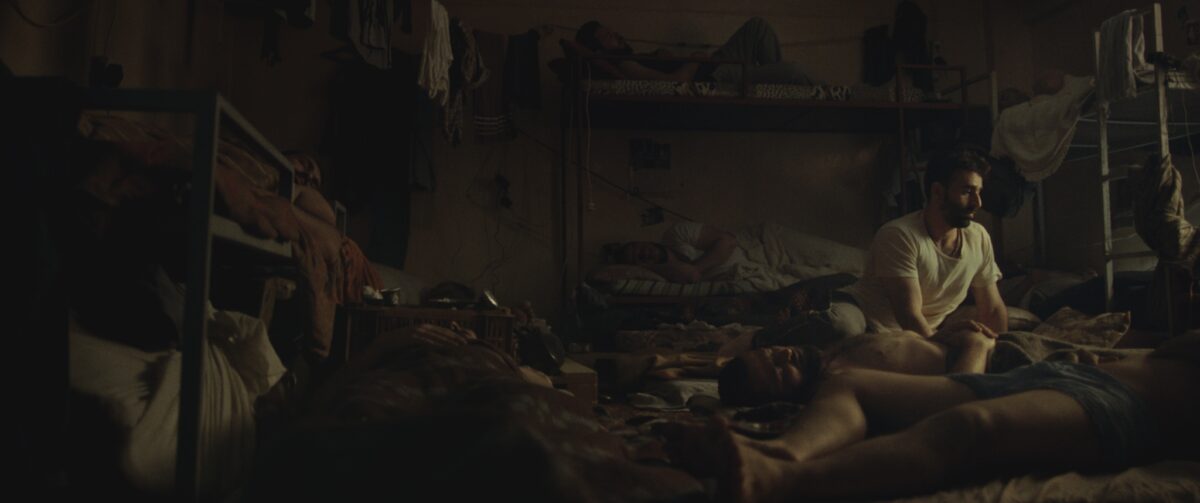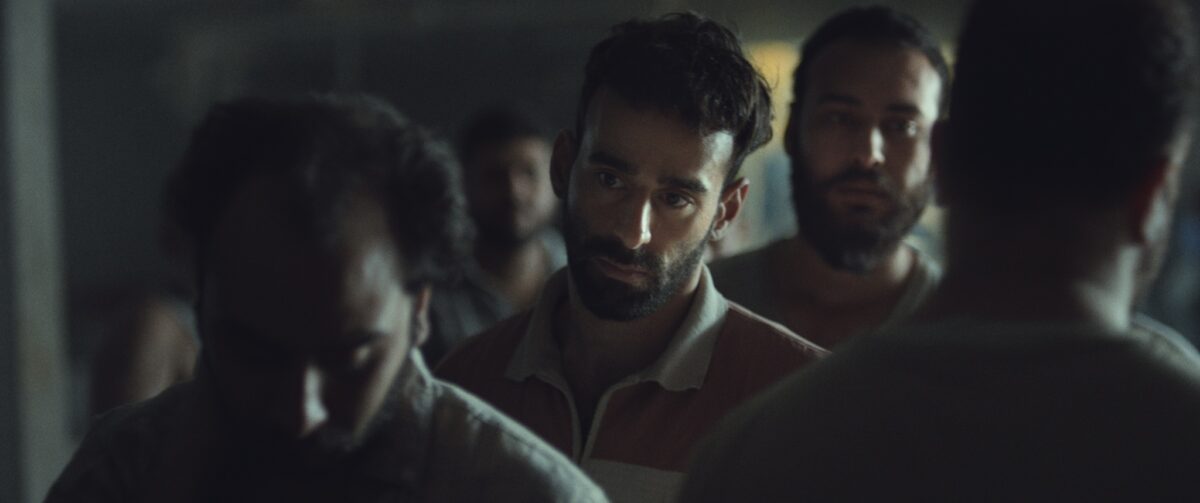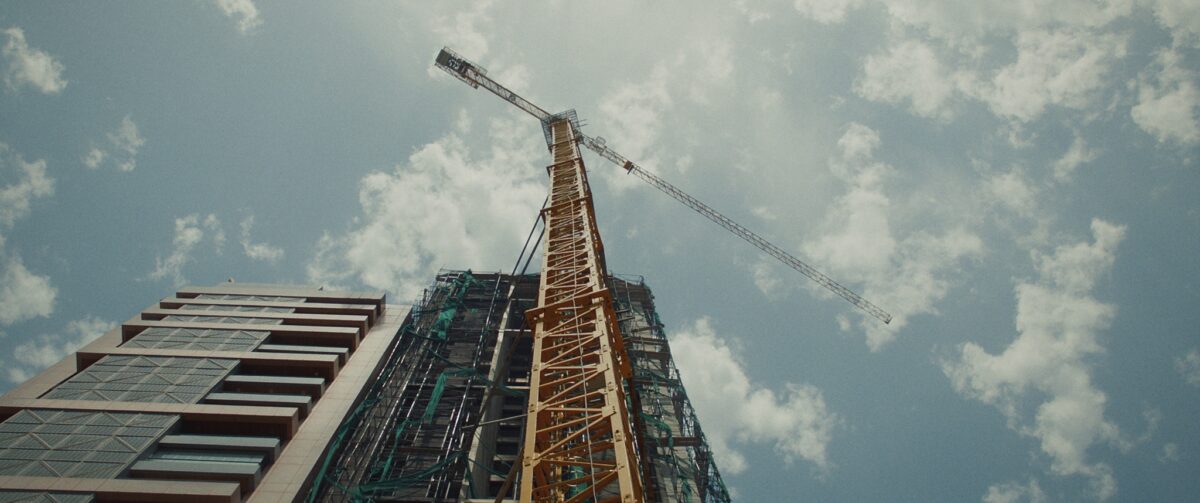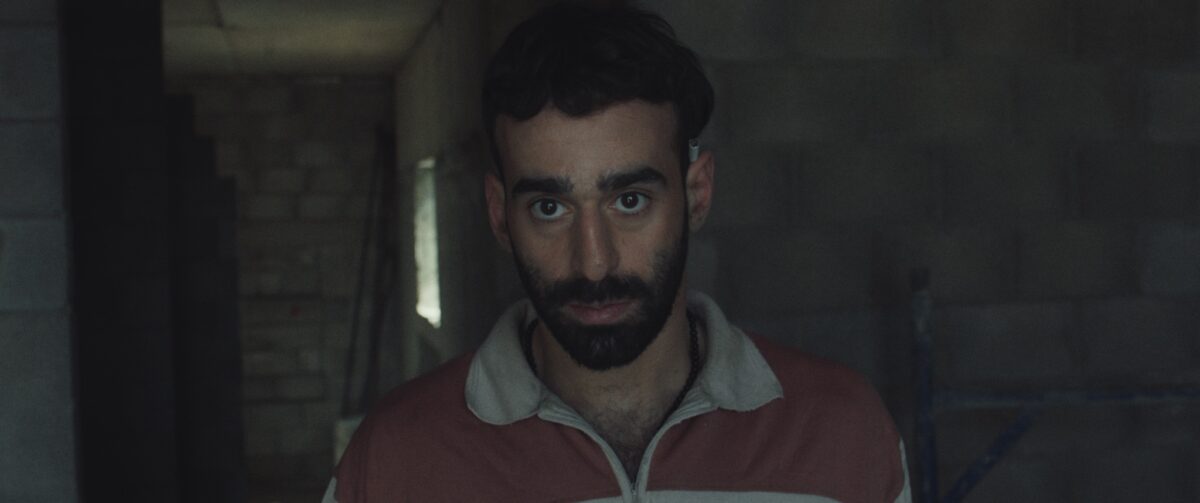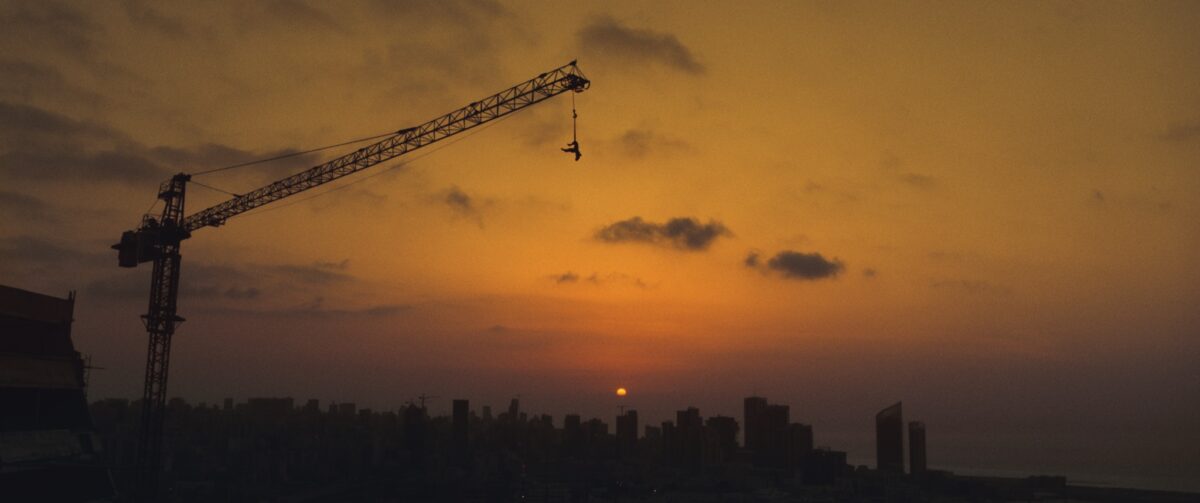Film-maker Dania Bdeir explores the plight of construction workers, in particular one who has a secret passion within.
Film and TV Now spoke with the film-maker about the short.
FILM AND TV NOW: The film does reflect an undercurrent of what it means to be both emotional and masculine. What was the start-off point for the script?
DANIA BDEIR: It all started when, in 2017, I was sitting on my balcony in Lebanon overlooking all of Beirut and I saw a man standing on top of one of the tallest construction cranes. At first I was afraid thinking the man was going to jump. It all looked so dangerous and unsafe. Then as he kneeled down and put his forehead to the floor, I realized that he was praying.
It was a beautiful sight and this is when I became infatuated with the mysterious world of crane operators. These little men who operate these gigantic beasts from these tiny cabins where they can see the world and no one can see them.
The more I spent time in construction sites speaking to engineers and workers, the more I was convinced that I wanted to make a film where the protagonist was a crane operator. Throughout my visits, I was overwhelmed with three main palpable aspects: That space is very masculine. It is very loud and the construction workers were all underpaid and often undocumented Syrians.
I was drawn to the idea that the crane operator, out of all these workers, was the only one who gets the chance to escape these three aspects when he climbs the dangerous ladder up towards the sky. Up there, there’s no noise, no judging eyes, no labels.
Soon after that, I had the chance to attend a performance by an amazing gender bending multi-talented artist called Khansa. After the performance, he and I talked for hours and I told him about Warsha. We started asking ourselves: what if what the crane operator is seeking up there in that cabin, is the space and privacy to break out of gender norms and express himself truly, in a way that he can’t in his daily life.
FTVN: The context of the film also reflects on the plight of immigrant workers. What do you feel could be done to make these lives better?
DB: The context of the film does reflect on the plight of immigrant workers. Everything in the film was inspired by reality and the reality is Syrian construction workers (just like other migrant workers in Lebanon) often live in poor conditions, have to go about their day with their heads down, taking as little space as possible and are easily replaceable in the workforce without legal protections.
This is quite a thorny issue, but at the core of it, I think the problems stem from deficient and unenforced labor laws. We have a political and legal setup in Lebanon that makes it far too easy for employers to utilize and under-provide for undocumented workers, and far too expensive for them to go through the proper legal channels to legaly employ foreigners.
This leaves both workers and businesses in vulnerable positions, where businesses often have a workforce that is not necessarily as skilled as it needs to be, and laborers that are not protected. The businesses and employers are then stuck in an endless cycle of exploitative behavior.
We need fair labor laws that don’t impose undue burden on businesses who cannot survive without migrant workers and that protect employee rights.
FTVN: Tell us about how you developed the on-screen character with your leading actor Khansa.
DB: Khansa and I built the character of Mohammad together. As I mentioned, Khansa is a multi-talented artist who uses his art, his voice and his body to defy gender norms and the definition of masculinity in the Middle East.
Khansa identified with the character of Mohammad and with the feeling of being different and of growing up in an environment that didn’t understand nor encourage his artistic inclinations. His entire practice was a process in which he had to actively seek out a space to be himself, seek out mentors, teaching himself music, dance and art.
Through this journey, he found truth and he found a way to be true to himself: someone who always challenges anything that we have been conditioned to think about how a person should be. Growing up in a full house with two brothers and a big family, he knew all too well the feeling of needing a private space to experiment and play freely away from everyone’s eyes.
Furthermore, during the preparation, it was very important to make sure that we were all operating with empathy and trying to experience this same story through different perspectives and not only our own. We organized for Khansa to spend two days working in a construction site where nobody knew that he was an actor and where he received no special treatment.
Khansa entered the male dominated world of Syrian workers and felt the physical & emotional strain, the pressures and the marginalization. He was able to bring this experience as well as a few key conversations into his performance and the psyche of Mohammad’s character.
FTVN: Tell us about your production team.
DB: Warsha is an international co-production between Inter Spinas Films (Nouvelle Aquitaine, France), Gogogo Films (Paris, France) and Né à Beyrouth (Beirut, Lebanon).
This film would not have been possible without the support and efforts of my incredible main producer Coralie Dias, founder of Inter Spinas Films. This was a very ambitious short film with a lot of challenges be it technical, financial and even socio-political but Coralie stuck by it and single-handedly raised almost the entire budget by herself. She brought on incredible French partners like Planète Rouge (Marseille) for VFX and Innervision (Strasbourg) for post-production and they helped take the project to another level.
The film was also co-produced with Pierre Sarraf, founder of Ne a Beyrouth (Producer of Oscar nominated feature film Capernaum) and the team there was handpicked by Marie-Lynn Nasrallah based on people who identified and felt strongly about the film and its message. I think all that love and passion comes across in the final film and I could not be more grateful for this dream team.
FTVN: We understand that the film was shot partly in France and partly in Lebanon. What locations did you use?
DB: For the cabin and crane shots, at first, I wanted to shoot everything on location in the cabin and I wanted us to figure out a way to do the performance safely. All it took was me going up there in 2018 in order to shoot the teaser for the film, for me to get convinced that there is no way that can ever happen. I’m someone who’s very comfortable with heights and even I felt dizzy as I climbed the crane ladder. There was no way that those scenes could be shot with a crew, even if limited, in such dangerous and high circumstances.
So my producer Coralie met the wonderful VFX company PLANETE ROUGE and together, we applied to and thankfully received a grant from Region Sud which allowed us to shoot at Province Studios in Martigues.
The only thing we shot in Lebanon was Mohammad climbing the crane ladder. After that, everything inside the cabin and everything related to the aerial chain performance was shot at Planete Rouge’s state of the art THE NEXT STAGE STUDIOS which was newly decked out with Unreal engine LED technology which is, in my opinion, the future of filmmaking.
FTVN: Tell us about the visual effects used in the film.
DB: The technology we used is the same one used in Marvel Films such as The Mandalorian. I was so incredibly happy for the opportunity to have this experience. When I first realized I wasn’t going to shoot on location, I was worried about having to shoot and direct Khansa in a green screen studio but what this technology does is it allows us to capture 360 drone images from Lebanon and input them into the 280 degrees curved LED walls.
Instead of having to imagine or tell Khansa to imagine that he’s seeing Beirut from above, we could all see the Mediterranean shimmering and truly feel the height of Beirut right there in the studio in France. The cinematographer and I were able to frame the character while seeing the background and it freed us up to behave as if we were shooting on location but without any of the danger. It was truly amazing and it looks so real.
FTVN: How did you raise finance for the film?
DB: Fundraising for a film about a Muslim man wearing lipstick and performing freely inspired by a Female Egyptian Diva, was not an easy feat, especially not in the Middle East. We only managed to get a couple of private investors who believed in the film enough to pitch in.
Coralie Dias, the main French producer was an extremely loyal collaborator who loved the story since the moment she heard it and never gave up on the film even with all the obstacles. She managed to single handedly fundraise most of the film’s budget.
She secured a pre-purchase deal with ARTE France, and got us some regional French funds such as région Grand Est, région Sud and Métropole Aix-Marseille-Provence. We also received some grants from CNC, SACEM and Organisation Internationale de la Francophonie (OIF).
FTVN: Would you like to expand on the issues and themes explored in this short into a feature length project?
DB: I don’t think so. This was a short film about a significant moment in a character’s life and that’s all I wanted to explore. I wanted to capture the feeling of breathing and of freedom after feeling suffocated and claustrophobic. I think this theme will continue to exist in my films but in different ways and with different characters.
FTVN: Who and what are your key cinematic influences?
DB: I’m a very big fan of Asghar Farhadi. I feel like his films do a wonderful job of representing a complex culture but then moving beyond it quickly enough so the audiences can focus on the characters and their human experience. This is something I really strive to do because I’d like to make Arabic films that feel both authentic to Arabs all the while presenting universal characters that anyone can relate to.
FTVN: You graduated from NYU Film School in 2016. What were the key things you learned from your time there and how much of an influence does a prestigious facility like that have on your life and career?
DB: NYU graduate film program was definitely one of the best experiences of my life. On one hand, it is an extremely reputable institution which was deemed the number 1 film school in the US in 2021 so, having been accepted even though it’s extremely competitive was a huge honor that definitely gives me a stamp of approval.
This gave us the opportunity to be taught by incredible professors and award-winning filmmakers such as Spike Lee, Todd Solondz and Barbara Shock among others. On the other hand, it was an extremely practical program in which we were constantly making films; oftentimes playing other roles on the crew apart from directing.
I think that’s an invaluable experience that allows us to put ourselves in the shoes of every other person on set. This teaches us how to communicate with our teams when we direct and to know what we can ask for and what we should offer so that they can be successful and thrive.
Finally, the most important thing I got from NYU is the community I gained. Apart from the friends from all around the world that I made who are like family, I am also part of a larger NYU grad film community that spans years before and after my physical time at the school. It’s a rock solid community that’s always there for each other, to help, answer questions, offer advice and share opportunities.
FTVN: You are of Syrian origin, but are a Lebanese / Canadian film-maker. How does this cross-cultural mix enhance your creative process?
DB: Each different part of my identity contributes to the way I experience the world and informs the way I tell stories. I feel very lucky to have this cross-cultural mix because it allows me to always challenge myself, question what I was taught and It forces me to always try to see the different facets of every story in order to find myself within it.
Diversity and gender in media are big topics at the moment. What are your hopes for the future and where do you feel support is needed to help female film-makers like yourself evolve in the industry?
My hope for the future is for there to be more female writers, more female directors, more female roles. We need stories that tackle the nuances of the female experience from a woman point of view. We are not a monolith.
Support is needed at every stage. It’s needed in schools to encourage women to apply, in universities that should prioritize and enforce gender parity. Professors should help women find their voices. Support is also needed in the film industry giving women opportunities and always calling out discrimination, sexism or toxicity in the workplace.
Since society still places the burden of child rearing and family care on women, it tends to create situations where women are pushed away because of some belief that “we can’t have it all”. I believe our entire society loses when we lose female storytellers.
My hope is to hear more from more Arab women as well. Often portrayed in the media as either silenced and oppressed or overly sexualized, we need to hear from our own voices. I believe some of the Arab funding entities, institutions and productions could do better in terms of prioritizing gender parity in their roster.
FTVN: How has the festival circuit helped your film so far?
DB: We haven’t screened the film anywhere yet. Sundance will be our world premiere and after that our European premiere will be at the renowned Clermont Ferrand international short film festival in France which is known to be one of the best short film festivals in the world. Both of these festivals take place in the end of January and beginning of February so I guess I’ll let you know then how it’ll help my film .
FTVN: What would you like to explore in future work?
DB: I’m currently developing my first feature film called PIGEON WARS which is a story set in Beirut.
It’s about a feisty young female university student, self-emancipated from her parents who goes around the streets of Beirut fighting patriarchy in whatever way she can. One day she stumbles across the mysterious male dominated Pigeon Wars of Beirut and becomes obsessed with conquering the skies. Throughout the journey and with the help of some important characters, she ends up realizing that her relentless drive stems from a deeper pain.
I’m also developing a couple of Dramedy series that can be set in the US or in Canada. With TV and streaming platforms evolving in such interesting and inspiring ways, I’d love to have the opportunity to get into episodic storytelling..
FTVN: Finally, what are you most proud of about this short?
DB: I’m proud of so many things but first and foremost, I’m so proud that we managed to get it done. It’s not common to work on a short film for 4 years and we’ve definitely had our fair share of obstacles and challenges along the way which made us want to give up, but we pulled through.
I feel lucky to have my team who believed in the film so much that they were always ready to pick up and fight for it every chance we had. So to reach the finish line and better yet to have the chance to premiere it at Sundance, it’s the greatest feeling in the world.


